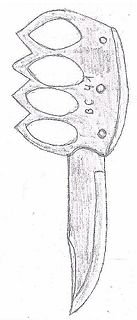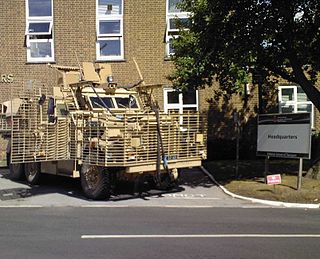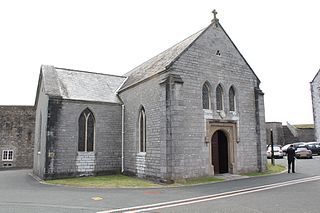 W
WThe Corps of Royal Marines (RM) is an amphibious light infantry and also one of the five fighting arms of the Royal Navy. The marines can trace their origins back to the formation of the English Army's "Duke of York and Albany's maritime regiment of Foot" at the grounds of the Honourable Artillery Company on 28 October 1664.
 W
WThe BC-41 was a combined knuckleduster and dagger weapon used by the British Commandos during World War II for close combat and ambush situations. Although effective, it was eventually replaced by the Fairbairn-Sykes Fighting Knife.
 W
WA beach armoured recovery vehicle (BARV) is an armoured recovery vehicle used for amphibious landings.
 W
WThe Volunteer Cadet Corps (VCC) is a national youth organisation managed by the United Kingdom's Royal Navy and sponsored by the UK’s Ministry of Defence. The VCC comprises of:Headquarters VCC. Based at Whale Island in Portsmouth. VCC Training Centre. Based at HMS Sultan. Royal Naval VCC. Units in HMS Collingwood, HMS Excellent and HMS Sultan. Royal Marines VCC. Units (Divisions) in Arbroath, Lympstone, Portsmouth, Gosport and Plymouth. plus the Band of the RMVCC Plymouth and the Band of the RMVCC Gosport.
 W
WThe Cockleshell Heroes is a 1955 British Technicolor war film with Trevor Howard, Anthony Newley, Christopher Lee, David Lodge and José Ferrer, who also directed. The film depicts a heavily fictionalised version of Operation Frankton, the December 1942 raid on German cargo shipping by British Royal Marines, when Special Boat Service commandos infiltrated Bordeaux Harbour using folding kayaks.
 W
WThe Commandant General Royal Marines is the professional head of the Royal Marines. The title has existed since 1943. The Commandant General Royal Marines is responsible for advising the First Sea Lord, with professional responsibility for all Royal Marine units; however his direct reporting line is to the Fleet Commander. He is assisted by a Deputy Commandant General, whose rank is brigadier. This position is not to be confused with Captain General Royal Marines, the ceremonial head. The Commandant General Royal Marines is the counterpart to the Commandant of the United States Marine Corps, although the latter is a full general. He is based at Navy Command, as part of the headquarters staff.
 W
WThe Corps Regimental Sergeant Major is the most senior warrant officer of the Royal Marines. Responsible for maintaining standards and discipline within the Royal Marines, they act as a parental figure to their subordinates and also to junior officers, even though the latter technically outrank the RSM.
 W
WThe Dartmoor Yomp is an annual charitable fundraising event run in aid of the various charities that support injured British Armed Forces Royal Marines. The Yomp is a daytime trek held in the Dartmoor National Park in the county of Devon, England, usually some 12 miles (19 km) in length, and is undertaken by disabled servicemen joined by able-bodied former and serving Royal Marines and their immediate families. The challenge is usually held over two days in September: a get-together on the Friday and the actual Yomp on the Saturday. The Dartmoor Yomp takes its name from the Royal Marines slang term "yomp", meaning a route march carrying full kit. It was founded in 2008.
 W
WThe Defence School of Transport (DST) is located at Normandy Barracks, Leconfield near Beverley, East Riding of Yorkshire in England.
 W
WThe Fairbairn–Sykes fighting knife is a double-edged fighting knife resembling a dagger or poignard with a foil grip developed by William Ewart Fairbairn and Eric Anthony Sykes in Shanghai based on concepts which the two men initiated before World War II while serving on the Shanghai Municipal Police in China.
 W
WThe Inflatable Raiding Craft (IRC) is a series of fast raiding and assault craft in service with the Royal Navy. Despite being among the smallest of the amphibious craft, the IRC is one of the most widely used due to its mobility and versatility. The IRC is essentially a type of inflatable boat, the American equivalent is the Combat Rubber Raiding Craft.
 W
WThe Island-class is a class of Police patrol boat operated primarily by the MOD Police Clyde Marine Unit at HMNB Clyde. They are tasked with protecting high value Royal Navy ships such as the Vanguard-class submarines. Royal Marines currently operate two ex police boats of the class Mull and Rona- these were handed over to the Royal Marines during 2013. Rona and Mull are interchangeable in their roles and can be used by both RM and MDP. The RMs also have a third vessel named Eorsa. Mod Police Portsmouth Marine Unit also operate Gigha and Lewis. Gigha was the prototype and first of class.
 W
WThe Landing Craft Air Cushion (LCAC) in British service is a small amphibious hovercraft able to transverse both land and water. Like all amphibious landing craft in the Royal Navy, they are operated by the Royal Marines to transport troops or equipment from ship to shore during an amphibious landing.
 W
WThe Landing Craft Vehicle Personnel (LCVP) is a versatile amphibious landing craft designed to transport troops or armoured vehicles from ship to shore during amphibious landings. The designation was first used in British service for the LCVP Mk2s introduced with the two Fearless class amphibious transport docks, the role having previously been carried out by the Landing Craft Assault developed during the Second World War. They are manned and operated by 1 Assault Group Royal Marines.
 W
WThe Royal Marines Museum is a museum on the history of the Royal Marines from their beginnings in 1664 through to the present day. A registered charity, it is also a designated service museum under the terms of the National Heritage Act 1983 and receives Grant-in-Aid from the Ministry of Defence. During 2011 it formally became part of the National Museum of the Royal Navy, an executive non-departmental public body of the Ministry of Defence. The museum's galleries are currently closed, pending relocation.
 W
WThe Offshore Raiding Craft (ORC) is a small, fast boat used by the Royal Marines for troop insertion, and patrols. The ORC is primarily used when undertaking strategic raiding missions, where speed and covertness is desired. However, it is equally capable when conducting larger scale amphibious operations alongside the larger and more traditional LCACs, LCUs and LCVPs.
 W
WThe Rigid Raider (RRC) is a series of fast raiding and assault craft made by RTK Marine, a subsidiary of Halmatic. They are primarily in service with two branches of the British Armed Forces: The Royal Navy and the British Army. Despite being among the smallest of the amphibious craft, the RRC is one of the most widely used due to its mobility and versatility. As such, the Rigid Raider often finds itself deployed in amphibious and riverine operations around the globe, in environments ranging from the Arctic to the tropics.
 W
WRoyal Marines Cadets are part of the Sea Cadets, a United Kingdom uniformed youth organization. They take part in all the waterborne activities, as well as branching off into adventure training and military skills too. Royal Marines Cadets specialise in activities such as orienteering, fieldcraft, and weapon handling. There are also Royal Marines Cadets of the Volunteer Cadet Corps and Combined Cadet Force; this article deals only with the Royal Marines Cadets of the Sea Cadet Corps.
 W
WThe Royal Marines Vanguard Strike Company is an experimental strike company of the Royal Marines. The company is currently, as of 21 July 2020, forming and preparing to have its first major deployment in 2021.
 W
WThe Royal Chapel of St Katherine-upon-the-Hoe is the garrison church within the precincts of the Royal Citadel in Plymouth. The original church on the site was licensed for services by the Bishop of Exeter, Thomas de Brantingham, in 1371. During the period 1666–1671, the original building was demolished and the present nave, chancel and sanctuary were rebuilt on the same site. The galleries and transepts were added in 1845 and give a symmetrical cross-like structure to the building.
 W
WThe Special Boat Service (SBS) is the special forces unit of the United Kingdom's Royal Navy. The SBS can trace its origins back to the Second World War when the Army Special Boat Section was formed in 1940. After the Second World War, the Royal Navy formed special forces with several name changes—Special Boat Company was adopted in 1951 and re-designated as the Special Boat Squadron in 1974—until on 28 July 1987 when the unit was renamed as the Special Boat Service after assuming responsibility for maritime counter-terrorism. Most of the operations conducted by the SBS are highly classified, and are rarely commented on by the British government or the Ministry of Defence due to their sensitive nature.
 W
WGeorge Lyon Tupman FRAS was the Chief Astronomer for the British astronomical expedition to Hawaii to observe the 1874 transit of Venus.
 W
WList of active Royal Marines military watercraft is a list of landing craft and other watercraft in service with the Royal Marines. It consist of a varied fleet of transport vessels, patrol vessels and special forces watercraft maintained by the Royal Navy and designed to transport the Royal Marines or special forces from ship to shore as well as conduct river or estuary patrols.
 W
WYomp is Royal Marines slang describing a long-distance loaded march carrying full kit. It was popularized by journalistic coverage in 1982 during the Falklands War. The origin of the word is unclear, and there is no evidence to suggest that it derives originally from an acronym. Various backronymic definitions have however been proposed, including “young officers marching pace”, "your own marching pace" and a connection with the term yump used in rally-driving in the sense of "to leave the ground when taking a crest at speed", apparently a Scandinavian pronunciation of jump.